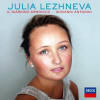Texte paru dans: / Appeared in:
*

International Record Review - (04/2013)
Pour
s'abonner / Subscription information
Decca
4785242

Consultez toutes les évaluations recensées pour ce cd
~~~~ Reach all the evaluations located for this CD

Russian soprano Julia Lezhneva has recently signed an exclusive contract with Decca and this is her first release on that label. She previously issued a disc of Rossini arias, which I have not heard but I believe garnered fairly positive reviews though with a caveat that she was really too young to get the full measure of the works (reviewed by Roger Pines in April 2011). It may be with such comments in mind that in Decca’s promotional video for this release, Lezhneva makes the point that the motets she has chosen are well suited for young voices . (I urge those curious about the disc to watch this video. Not only does it give a good sense of the music and the performances, it suggests that the singer is really delightful and intelligent young woman.)
She is certainly right in the case of the most famous work on the disc, Mozart’s Exsultate, jubilate, which was written by a 16- year-old for a 26-year-old virtuoso castrato, Venanzio Rauzzini. Some would regard this much-recorded work as the centrepiece of the recital and in a sense it is. However, Lezhneva has cleverly constructed a programme that places Mozart’s most beloved motet as the culmination of a very Baroque tradition. This is a shrewd approach. It solves the problem of finding other suitable sacred works by Mozart without engaging a choir and it also allows us to hear works very similar in structure and approach, if not in style. The late Baroque and early Classical sacred motet for solo voice frequently consisted of two arias (occasionally more) linked by recitatives, some accompagnato, and ended with a fond yet very tuneful setting of the word ‘Allelulia’ — hence the title of the disc. Another famous example, not included in this programme, is Bach’s cantata Jauchzet Gott in allen Landen. Placing Classical and Baroque vocal works side by side on a disc often has a jarring effect. However, because of the continuities in structure and mood, this is not the case here. They are all in effect ‘concertos for voice’ as they have been called (a double concerto in the case of the Bach cantata, with its spectacular trumpet part).
Fans of Baroque sacred music are likely to know Vivaldi’s tempestuous motet In furore justissimae irae — it has been brilliantly recorded by, among others, Catherine Bott, Kate Eckersley, Mária Zádori, Suzie LeBlanc and Simone Kermes. Less well known is Handel’s Saeviat tellus, which formed part of his ‘Carmelite Vespers’ dating from his Roman sojourn in 1707. (One wonders if this proud Lutheran later blushed to remember its exuberantly Catholic text.) It is a vocal showpiece of the highest order, including thrilling high Ds in the opening aria. Porpora’s In Caelo stelle clare is, I think, new to disc and is an absolute delight, with memorable melodies and cascading trills, written in a slightly later style than the Vivaldi and Handel.
All four works are accompanied by a full string orchestra, not a chamber group, joined in the Handel by a pair of oboes and in the Mozart by two oboes and two horns. The Italian period-instrument ensemble Il Giardino Armonico, under the direction of Giovanni Antonini and led by one of my favourite period violinists, Dmitry Sinkovsky, plays with tremendous flair and élan. The inclusion of a Baroque harp in the continuo group, played by Marget Koelli, makes a subtle but delightful contribution.
As for Lezhneva herself, her fresh, young voice and amazing facility with both florid and lyrical writing make her an ideal interpreter of this repertory, as does her flawless execution of fully articulated trills. Her serene legato in ‘O nox dulcis’ from the Handel motet, for example, is as impressive as her dazzling coloratura and fioriture in the various concluding ‘Alleluia’ settings and elsewhere. Nor is she afraid to add her own sometimes surprising but apt ornamentation — listen, for example, to the da capo in the ferocious opening aria of In Furore. Just occasionally, notably in the recitative in the Porpora motet, she pushes her voice too hard for dramatic effect. Lezhneva also changes her voice slightly when singing Mozart. It has a slightly more covered quality and she applies a mild shade of vibrato — the result is still very attractive but marginally less so than her ‘Baroque’ voice. (Those who find her voice too ‘white’ generally may prefer her Mozart singing.) Nevertheless, it is still one of the best performances of Exsultate, jubilate on disc.
This is a quite lovely disc - fabulous music, ravishingly
sung and played. I enjoyed it enormously.
Fermer la fenêtre/Close window
Cliquez l'un ou l'autre
bouton pour découvrir bien d'autres critiques de CD
Click either button for many other reviews


